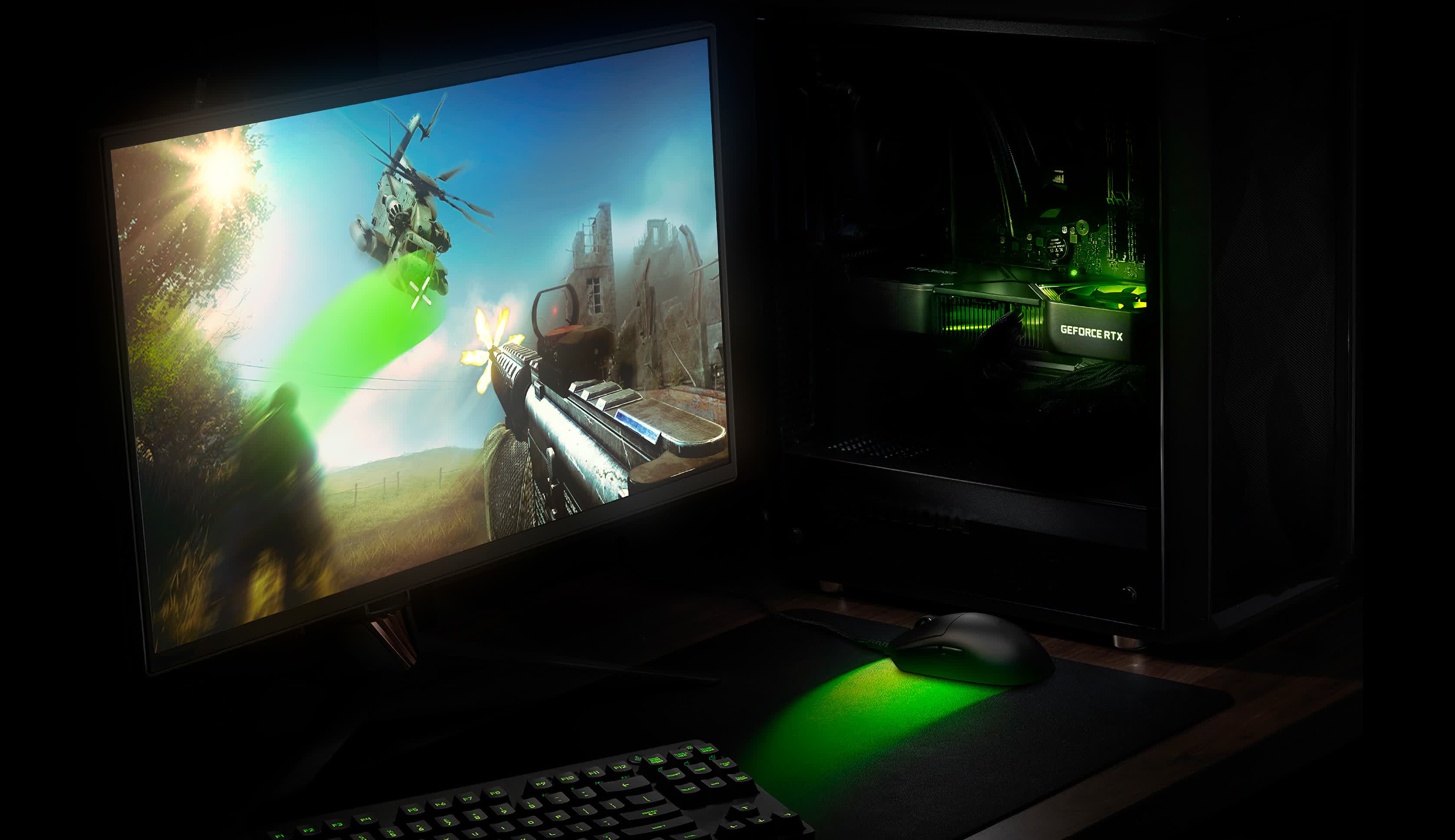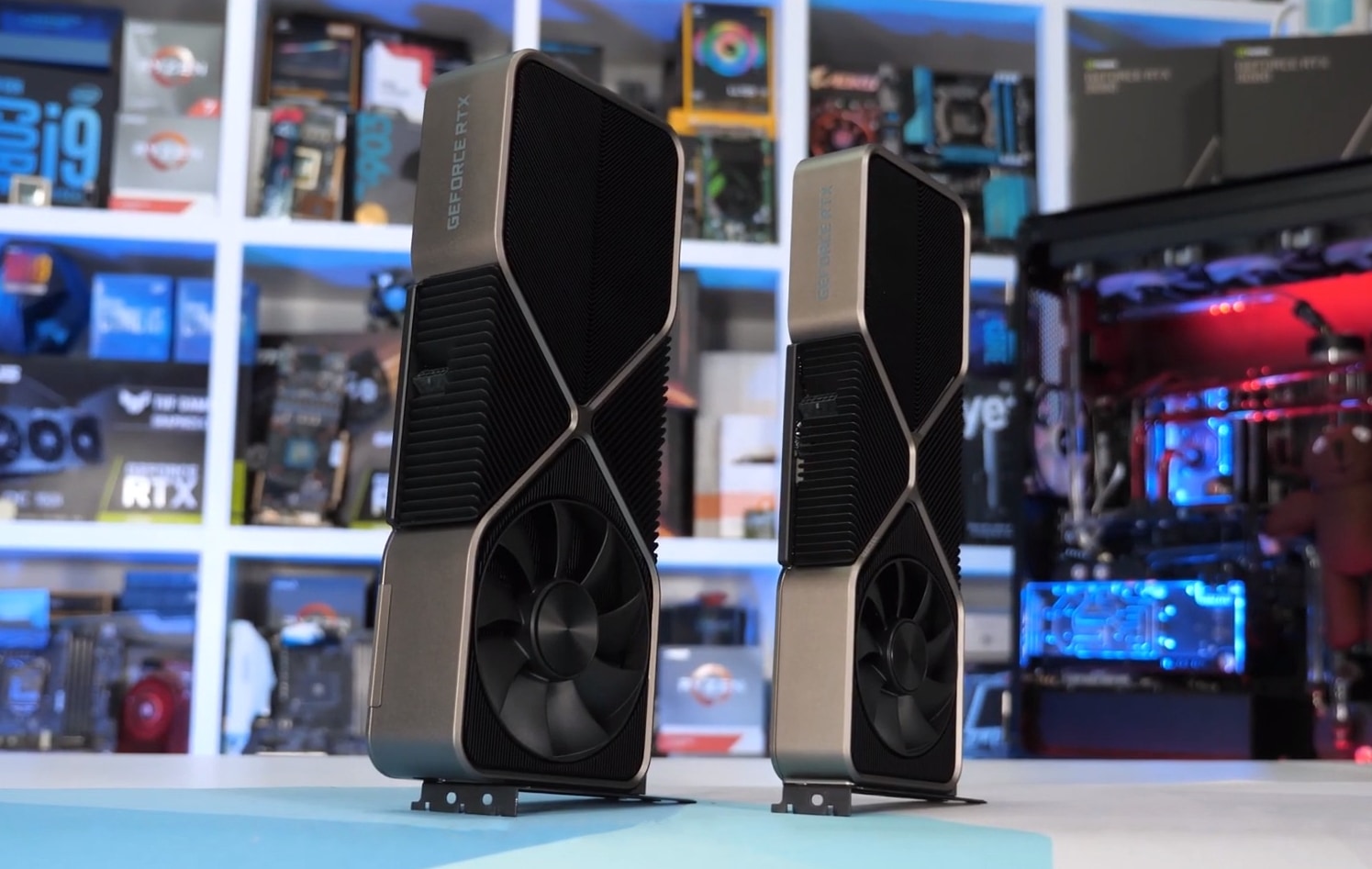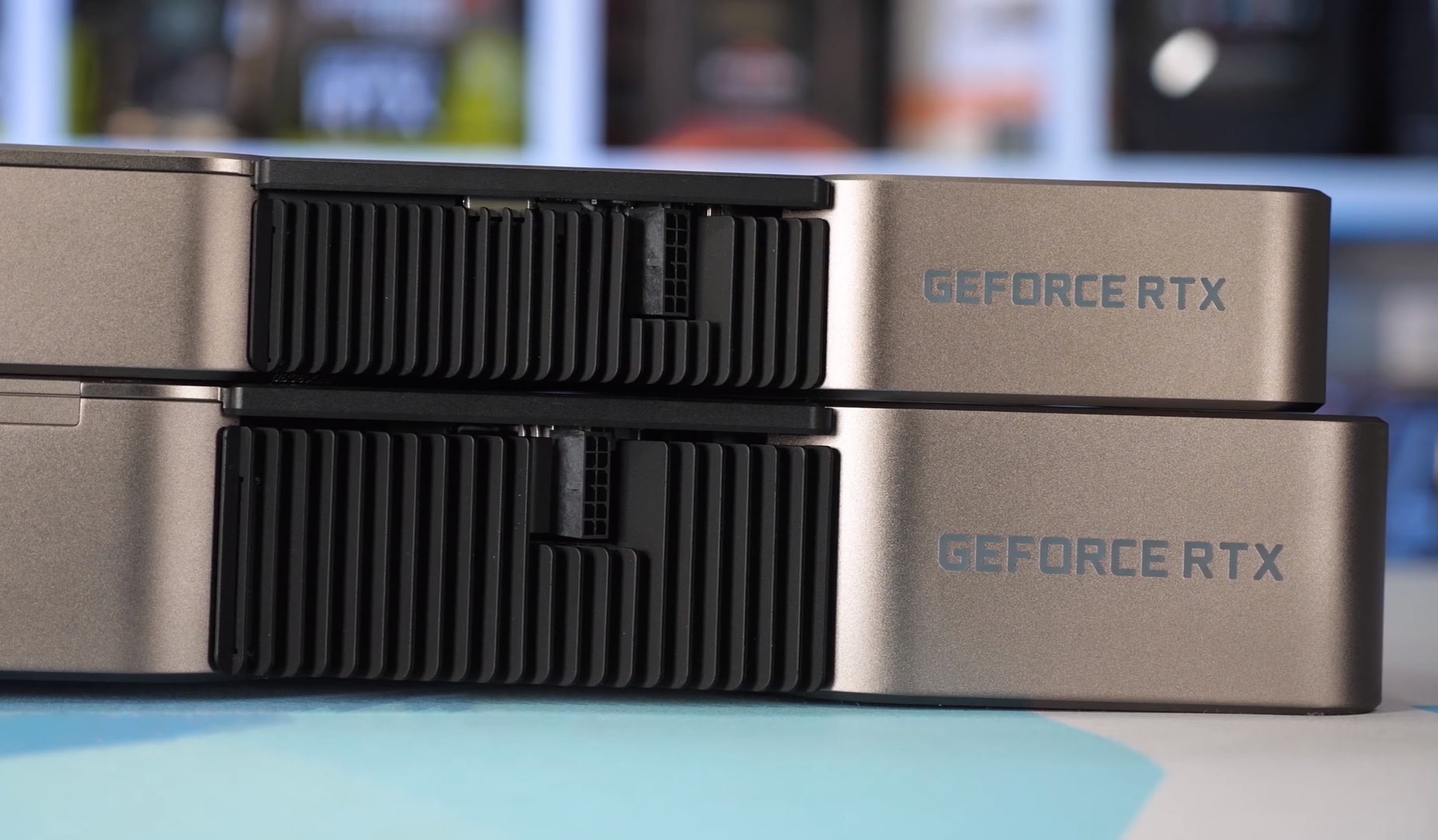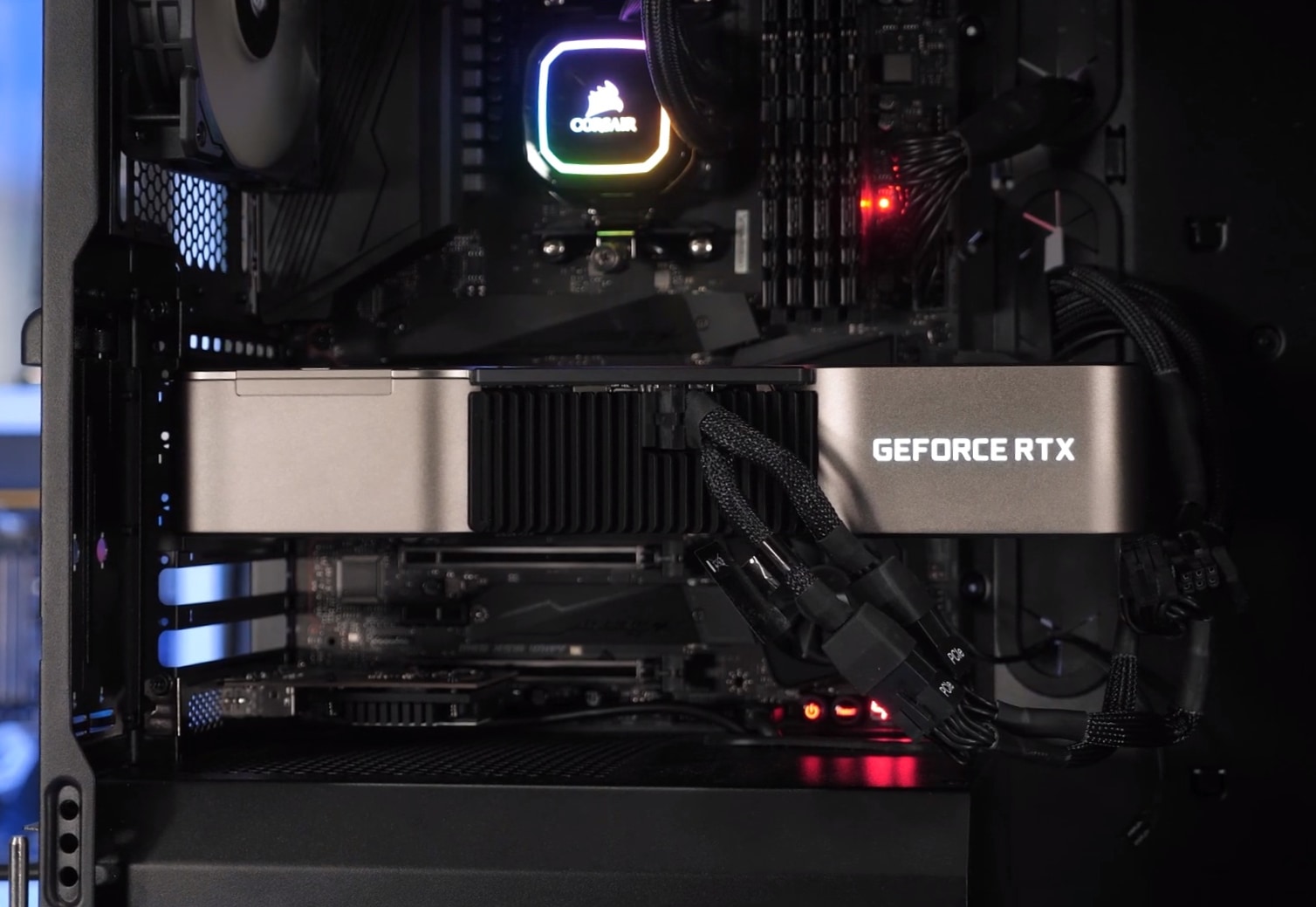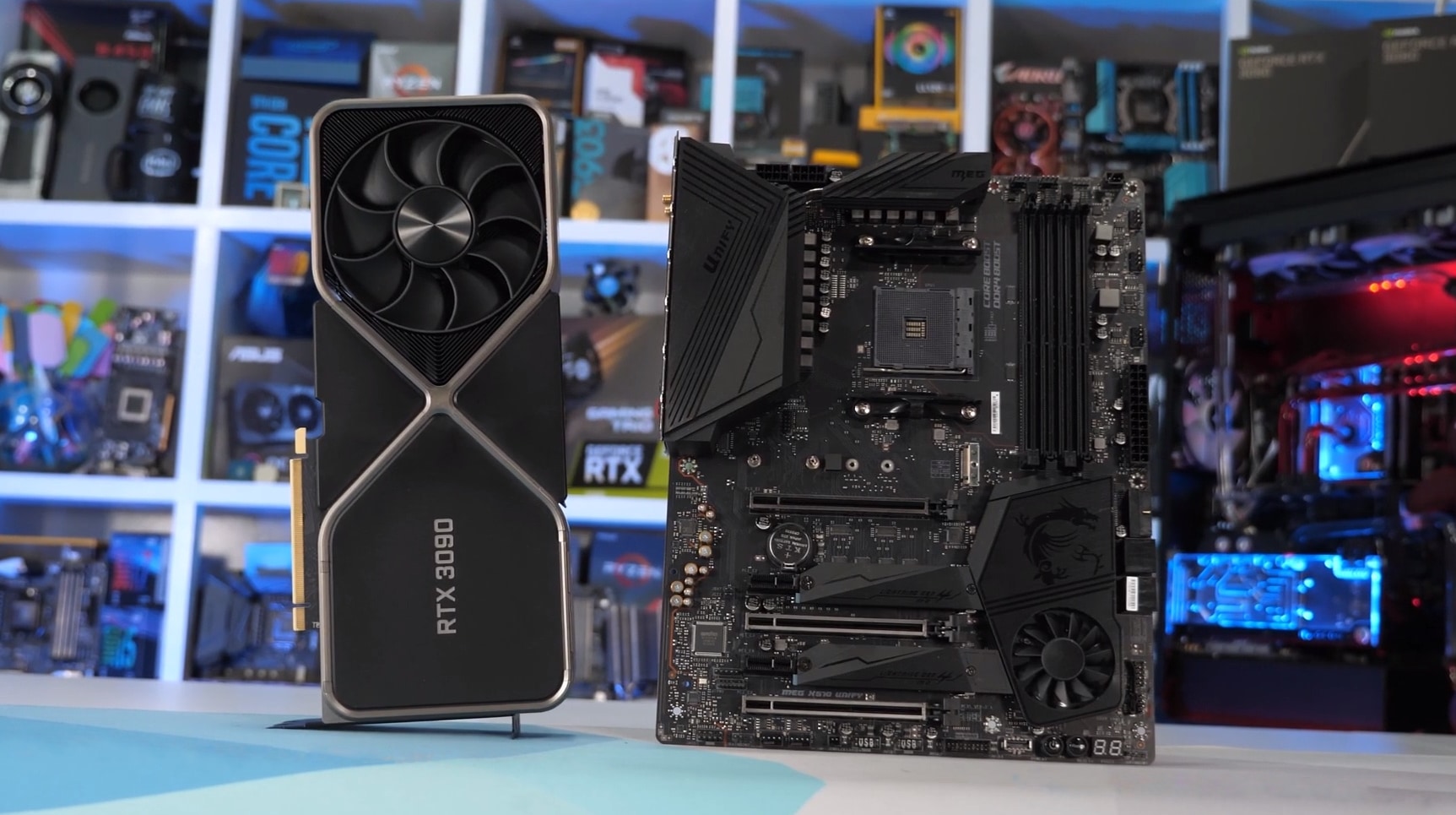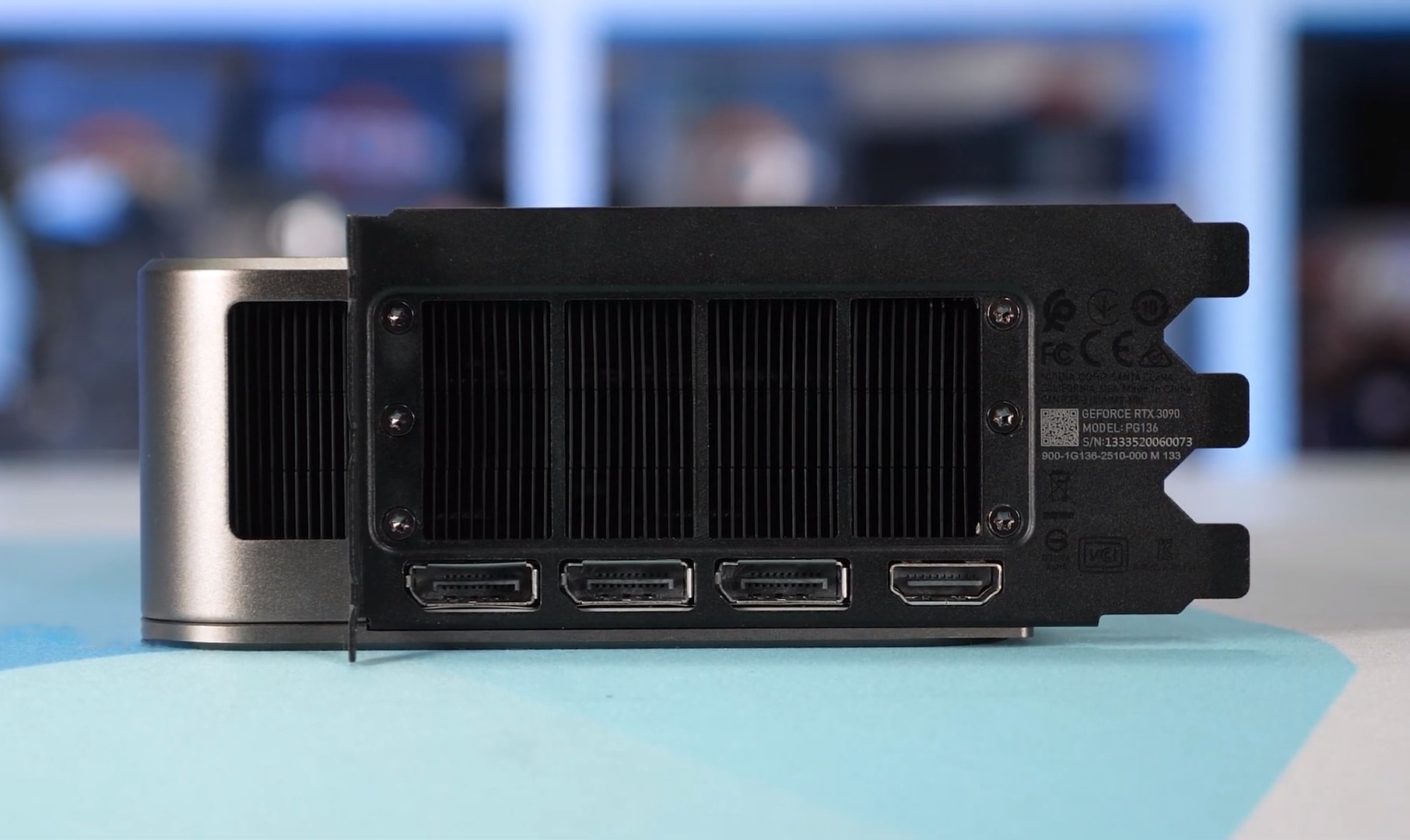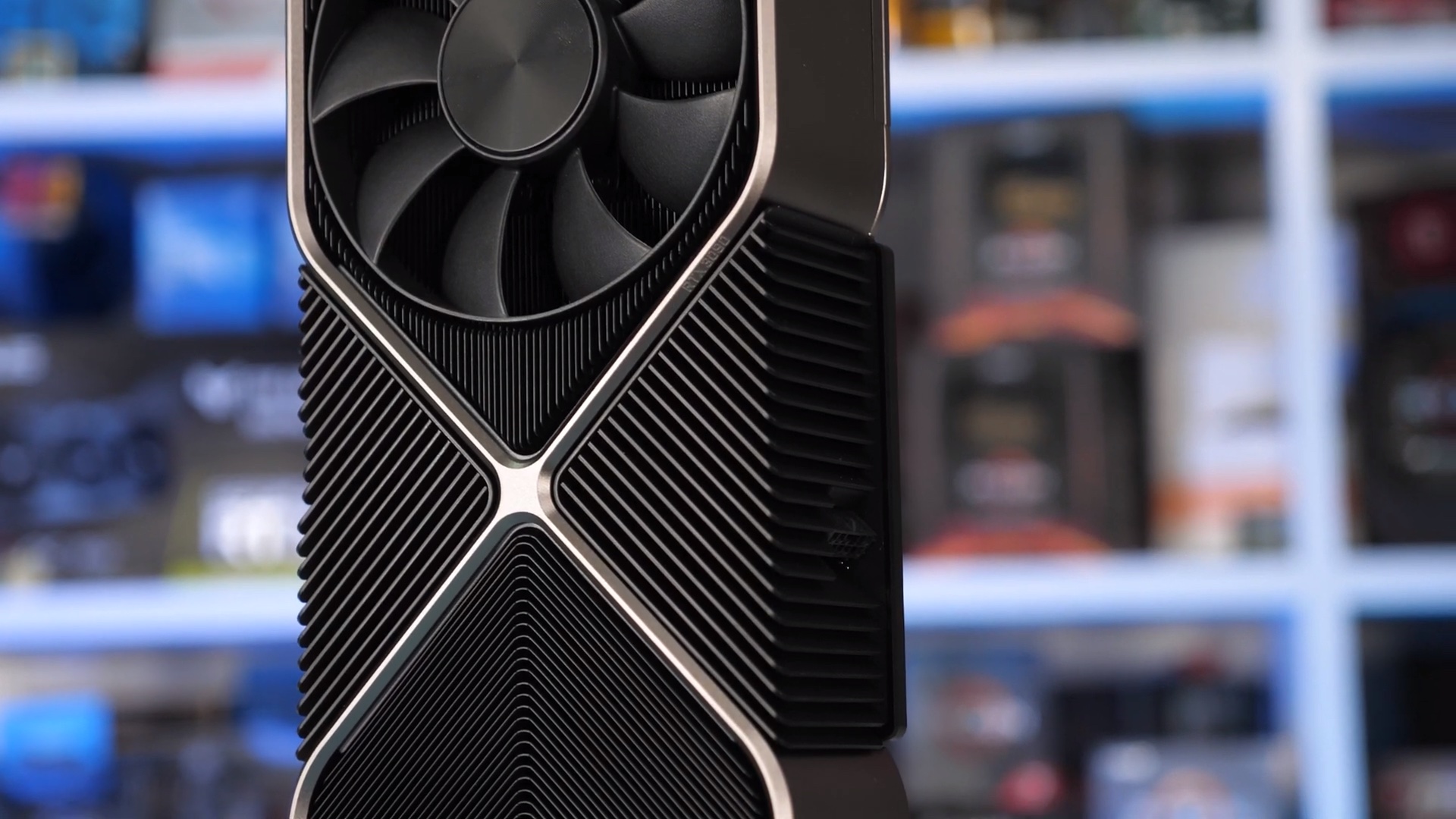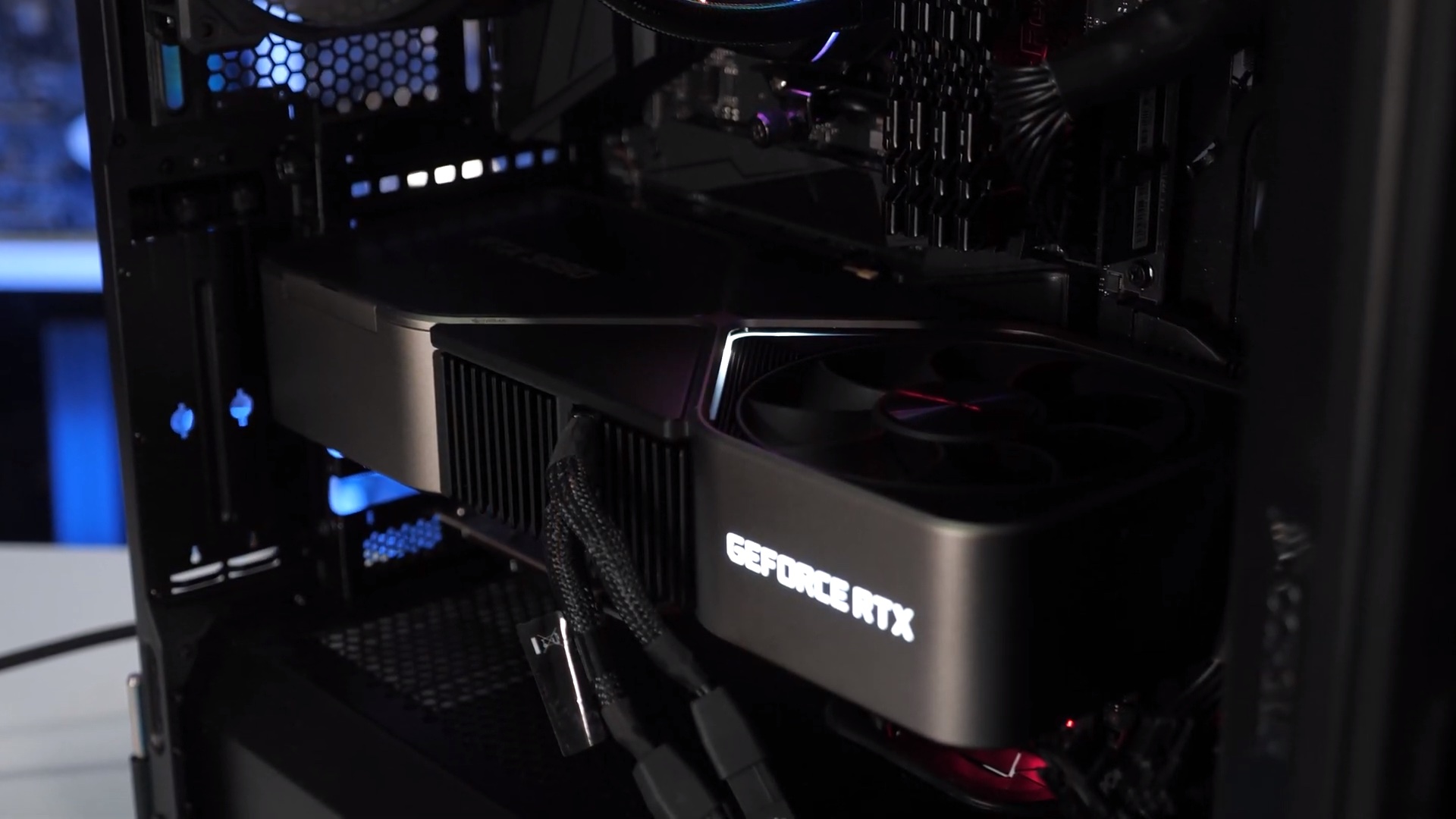Here's our first look at the new GeForce RTX 3090, Nvidia's latest 'Titan' class GPU. Although it's not actually called a Titan – we guess RTX Titan was already taken – RTX 3090 works for us and perhaps more importantly, when compared to many of the previous Titan-class products, we feel the 3090 is more significant.
The RTX 3090 is similar to the Maxwell Titan X as it packs more VRAM and more cores than the next fastest GeForce GPU. In this case, it features 21% more CUDA cores than the RTX 3080 and more than twice as much VRAM with an insane 24GB of GDDR6X memory, and of course a titanic $1500 price tag.
Nvidia was quick to point out that gamers shouldn't expect something that's going to compete strongly in terms of cost per frame with the RTX 3090. This is a product for those who simply want the best, a no-compromise type solution. Nvidia also noted they were surprised by just how much demand there was for such a product on previous iterations. That demand came from content creators as well as gamers seeking the ultimate performance and those all important bragging rights.
That is the RTX 3090 in a nutshell, if you can afford it and want the best out there. The only potential use case where we'd say the 3090 is required is for those who can take advantage of the massive 24 GB VRAM buffer, which could be highly beneficial for animation and 3D modeling tools like Autodesk Maya or Blender, or video editors working with 8K raw footage.
If you fall into one of those categories and know your software can take full advantage of the fast and ample memory capacity, the RTX 3090 is going to be exceptionally good value. Typically though, when we review GPUs we mostly dedicate to the enthusiast and gamer crowd, and today's review won't be any different.
The focus of this review will be on the RTX 3090 GPU, not Nvidia's Founders Edition graphics card. But because this thing is so insane, we'll give you a few quick stats: it measures 313mm long, stands 124mm tall, and is 52mm thick – it's a beast in terms of dimensions and does take up three expansion slots. But the most impressive stat is its weight, this thing tips the scales at 2125 grams (4.7 pounds), making it the heaviest graphics card we've ever seen.
Pulling and pushing air through the maze of heatsinks are two 110mm fans and like the RTX 3080 FE model, air is exhausted all over the place and we'll look at thermal performance later in the review. Then around at the I/O panel we get the same configuration as the RTX 3080: one HDMI 2.1 port and three DisplayPort 1.4a outputs. It's a seriously impressive graphics card and the best design Nvidia has produced by a country mile.
In addition to our usual battery of gaming benchmarks, we'll briefly touch on Blender performance. Anticipating this is not a value-seeking graphics card, we won't weight our conclusions too heavily on things like cost per frame, though it will remain part of our analysis. Spoiler alert: games don't require 24 GB of VRAM yet.
| GeForce RTX 3090 | GeForce RTX 3080 | GeForce RTX 2080 Ti | |
| Price | $1500 | $700 | $1200 |
| Release Date | September 2020 | September 2020 | September 2018 |
| Process | Samsung 8N | TSMC12FFN | |
| Transistors (billion) | 28 | 18.6 | |
| Die Size (mm2) | 628.4 | 754 | |
| Core Config | 10496 / 328 / 112 | 8704 / 272 / 96 | 4352 / 272 / 88 |
| Core Clock Frequency | 1400 / 1700 MHz | 1440 / 1710 MHz | 1350 / 1545 MHz |
| Memory Capacity | 24 GB | 10 GB | 11 GB |
| Memory Speed | 19.5 Gbps | 19 Gbps | 14 Gbps |
| Memory Type | GDDR6X | GDDR6 | |
| Bus Type / Bandwidth | 384-bit / 935.8 GB/s | 320-bit / 760 GB/s | 352-bit / 616 GB/s |
| TGP | 320 watt | 320 watt | 250 watt |
Here's a side-by-side spec comparison with the RTX 3080. Both GPUs are based on the same GA102 die, the 3080 is just a cutdown version. As mentioned earlier the 3090 packs 21% more CUDA cores as well as 21% more texture mapping units, but just 17% more render output units or ROPs. In terms of core clock speeds both are similar, but the 3090 receives slightly faster GDDR6X memory hitting 19.5 Gbps and when paired with the 384-bit wide memory bus is good for 935.8 GB/s of memory bandwidth, so a 23% increase over the 3080.
Based on those figures you'd expect the RTX 3090 will at most be ~17% faster than the 3080 in games, but due to the way these architectures typically scale, in most games the gains are probably going to be less than that, making the RTX 3080 the more attractive graphics card for a majority of high-end gamers.
For testing we're using a Ryzen 9 3950X system, featuring four sticks of low latency DDR4-3200 memory operating in a dual-channel, dual-rank configuration. The focus will be on 4K gaming results, though we'll also include 1440p benchmark data as well.
Benchmarks
Starting with Death Stranding we see that the 1440p results are very underwhelming, though we could be a little CPU limited here. Even when increasing the resolution to 4K, which sees the GPU become the primary system bottleneck, the RTX 3090 is a mere 6% faster than the 3080, taking the average frame rate from 107 fps to 113 fps. We weren't expecting a ton, but we've got to say this is a discouraging result.
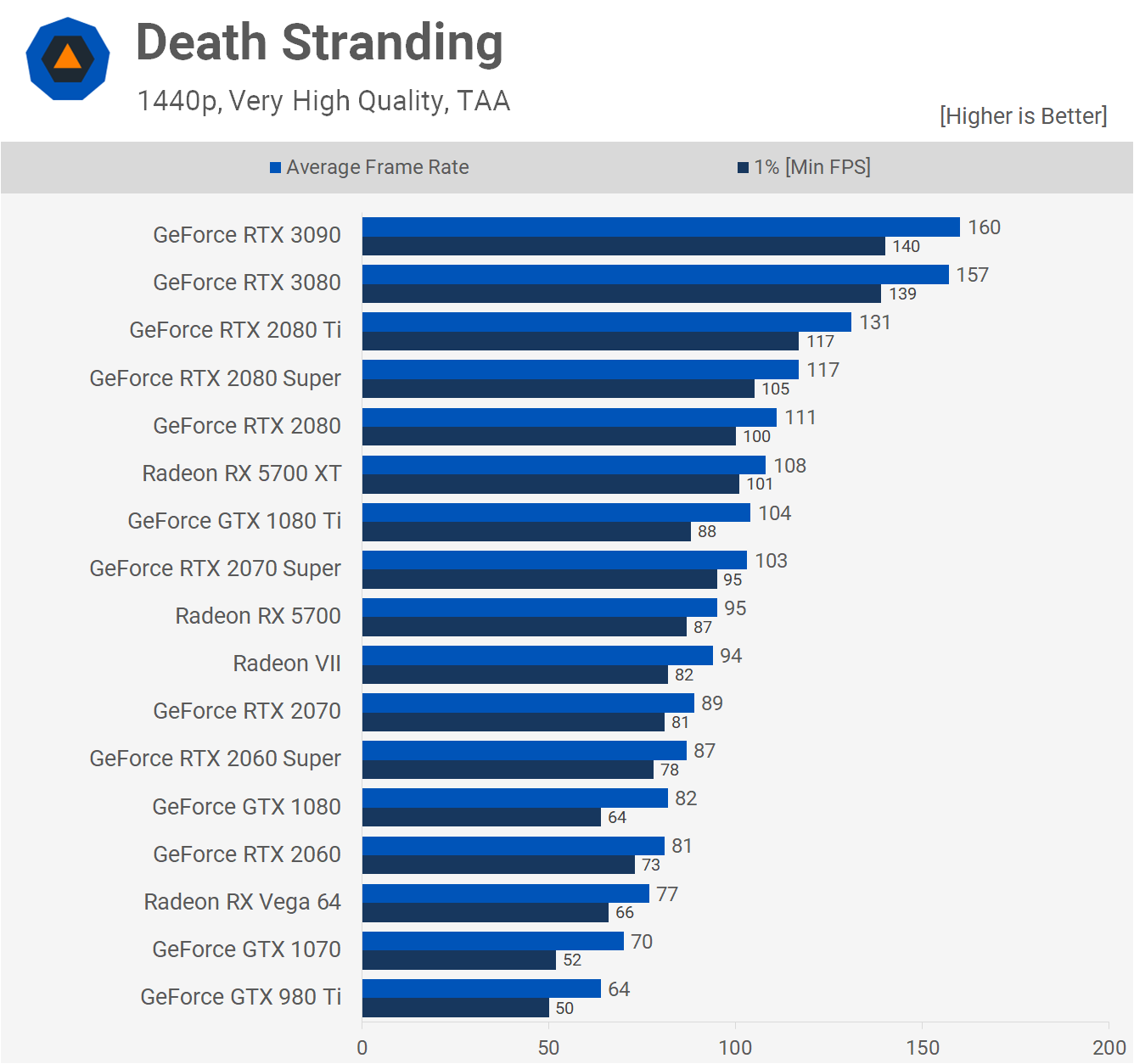
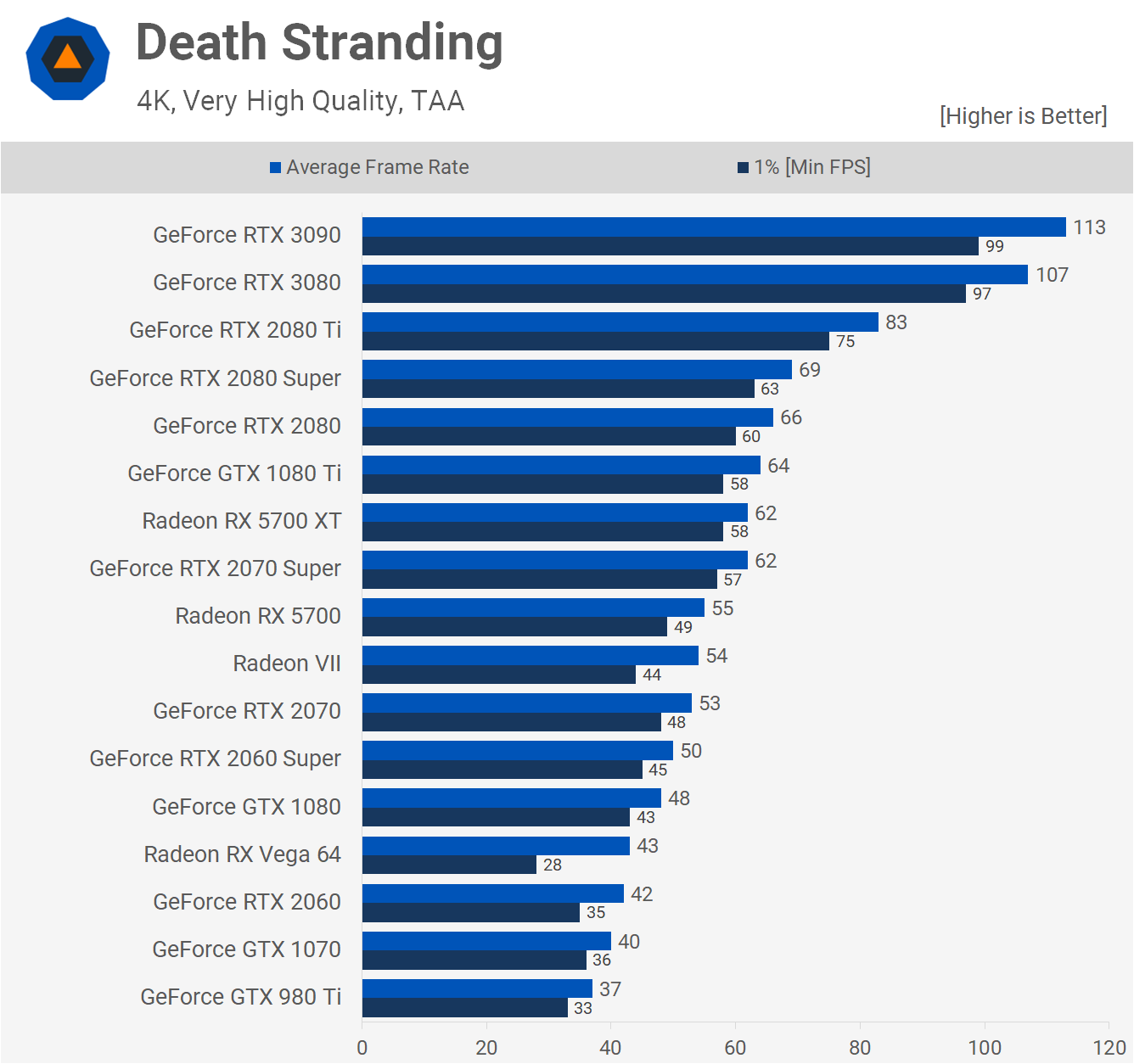
Next up we have Horizon Zero Dawn and we're again looking at weak performance gains at 1440p, just a 7% jump over the RTX 3080...
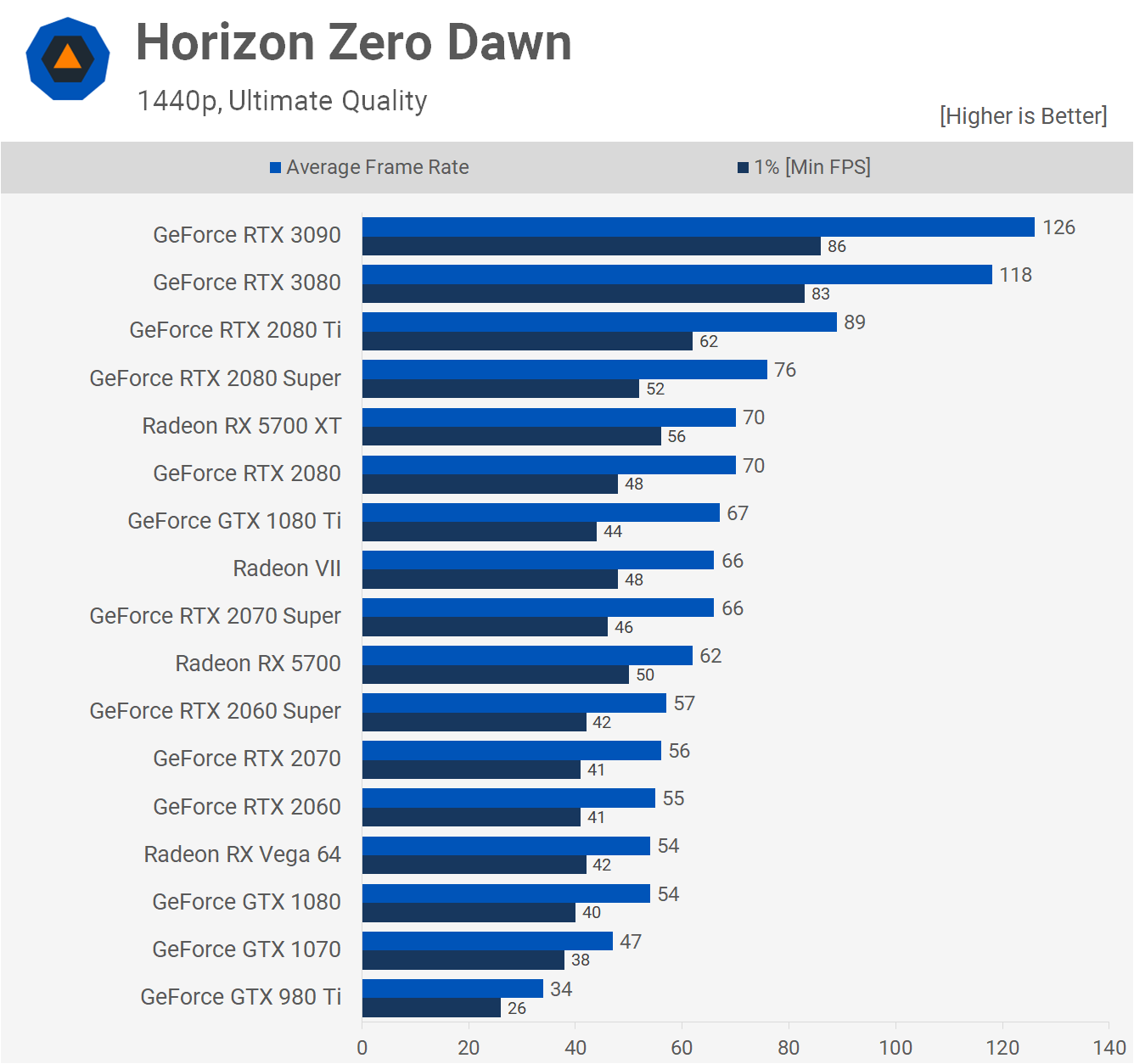
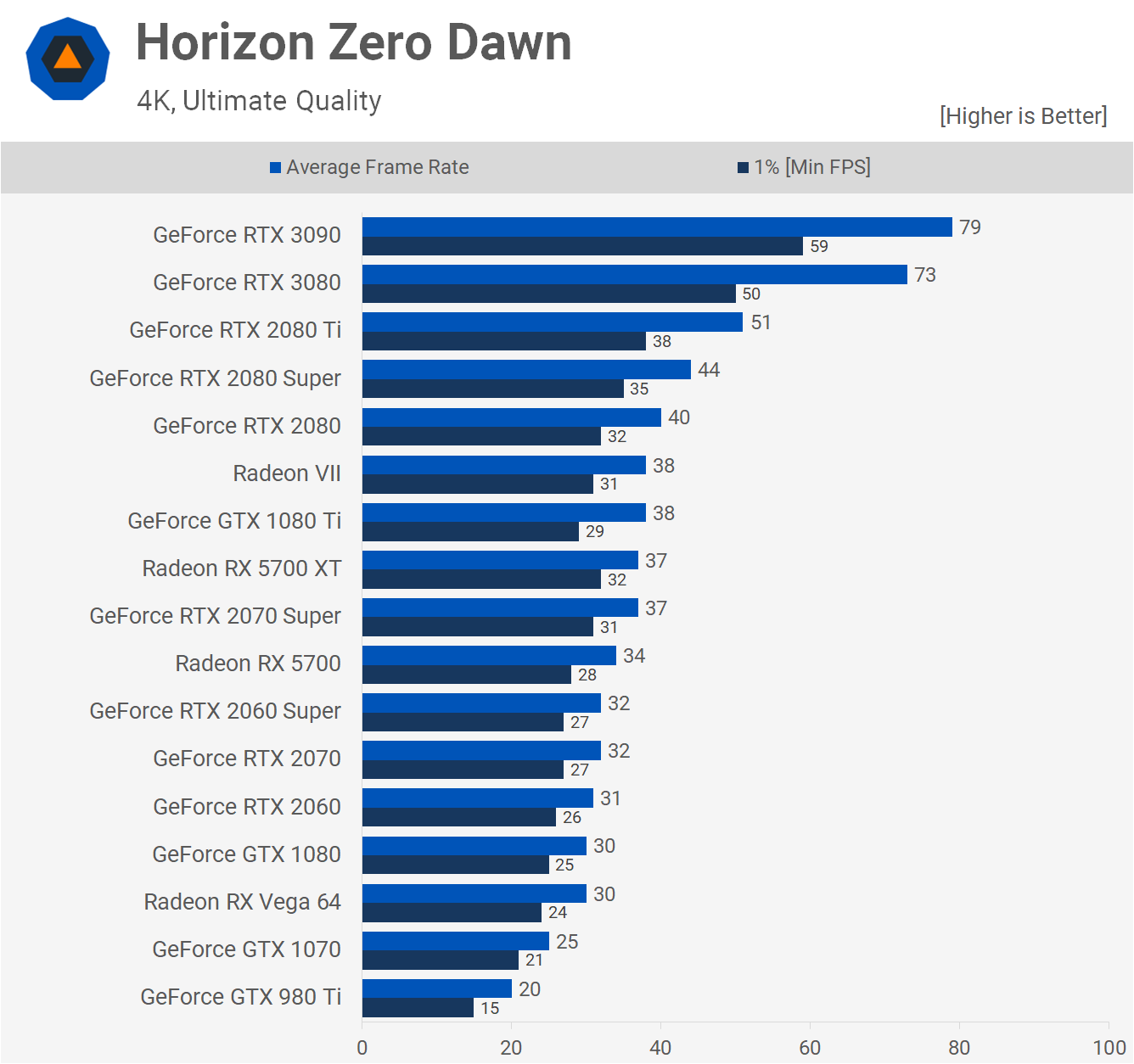
At 4K resolution the only performance limiting component is the graphics card and despite that the RTX 3090 is just 8% faster than the 3080, taking the average frame rate from 73 fps to 79 fps. We do see a healthy 18% boost to the 1% low performance, but even that is underwhelming for this comparison.
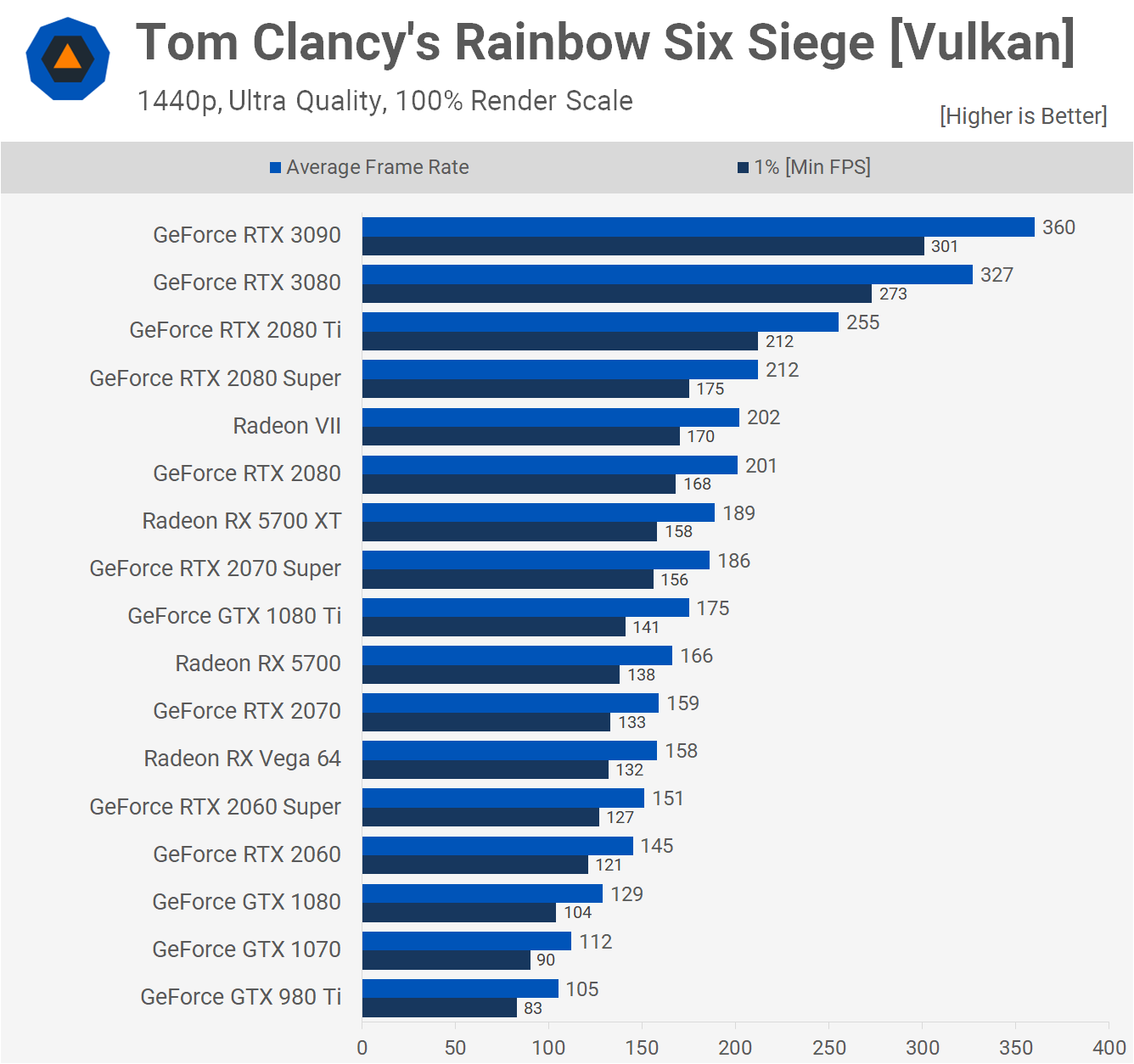
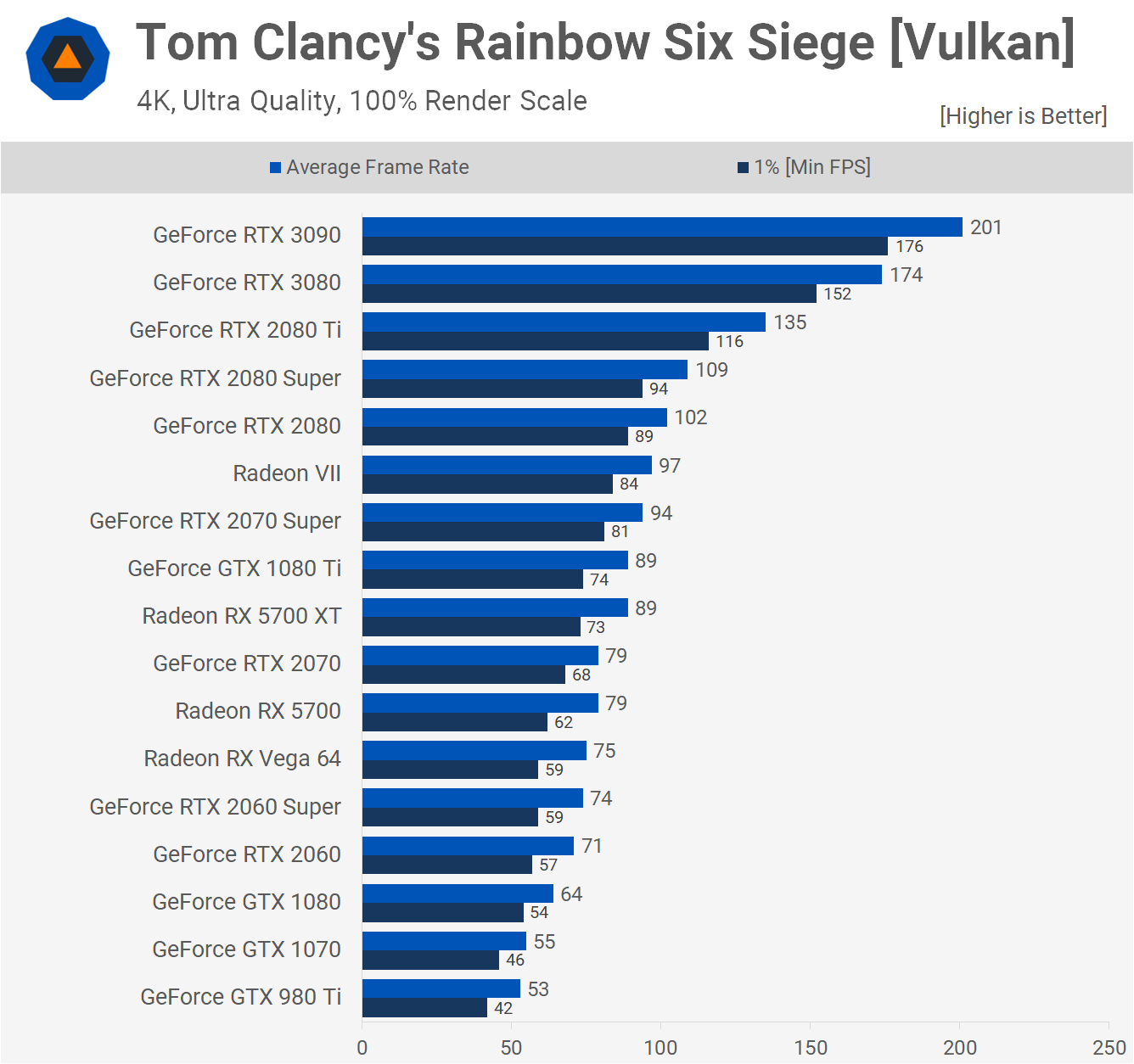
Rainbow Six Siege sees a 10% boost at 1440p which takes us from 327 fps with the RTX 3080 to 360 fps with the RTX 3090, not amazing but it is a double-digit gain.
The 4K results are more impressive with a 15% performance uplift and we can tell you straight away this is the biggest margin we saw in the 14 games we tested, so... we will avoid repeating ourselves with another 11 titles and simply sum it all up in one larger graph.
Performance Summary
Here's our 14 game average for all the 1080p, 1440p and 4K benchmark data we gathered. We'll also check out power consumption, cost per frame, and the margins seen in individual titles. Oh, and then a quick look at the Blender render performance.
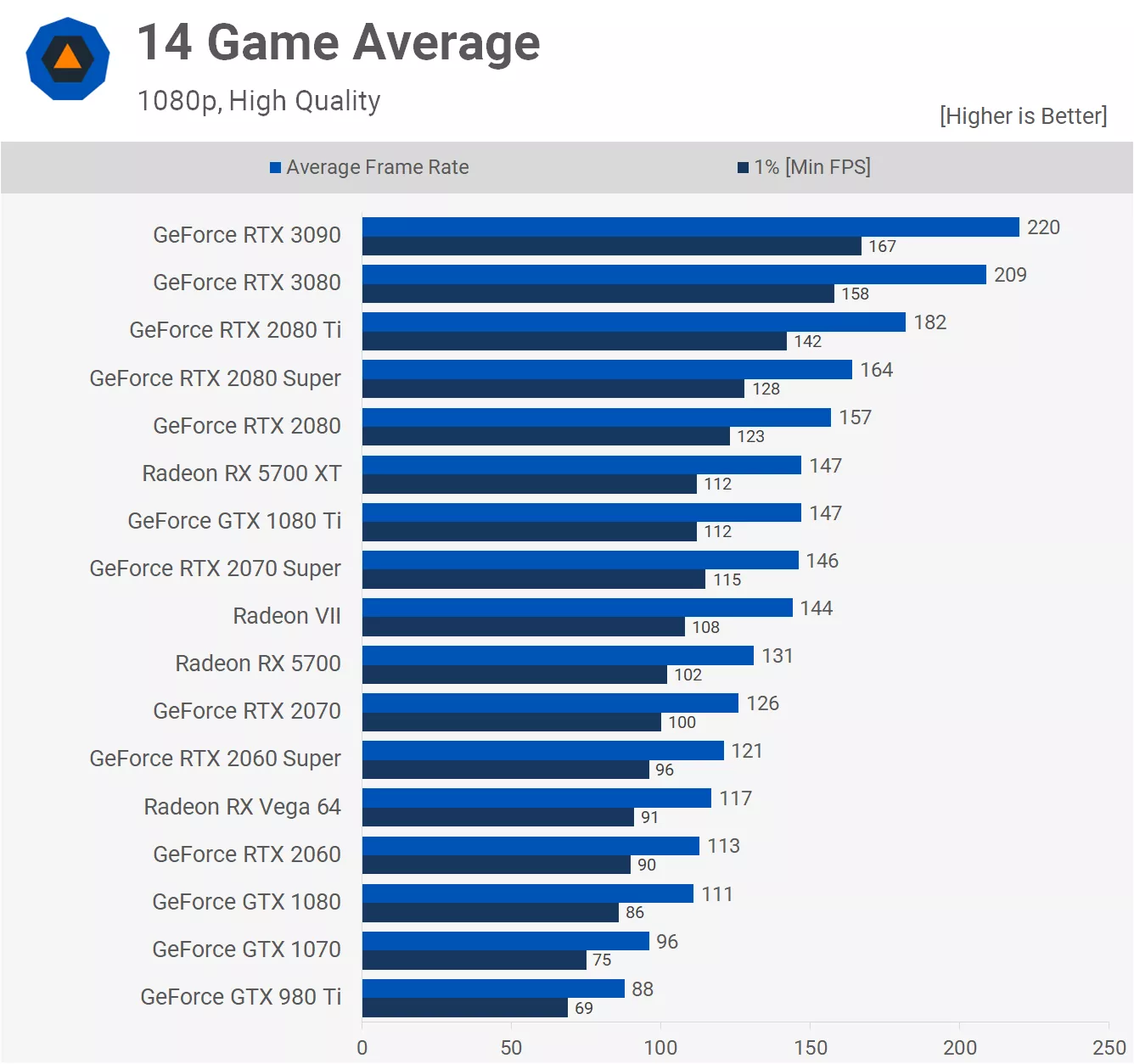
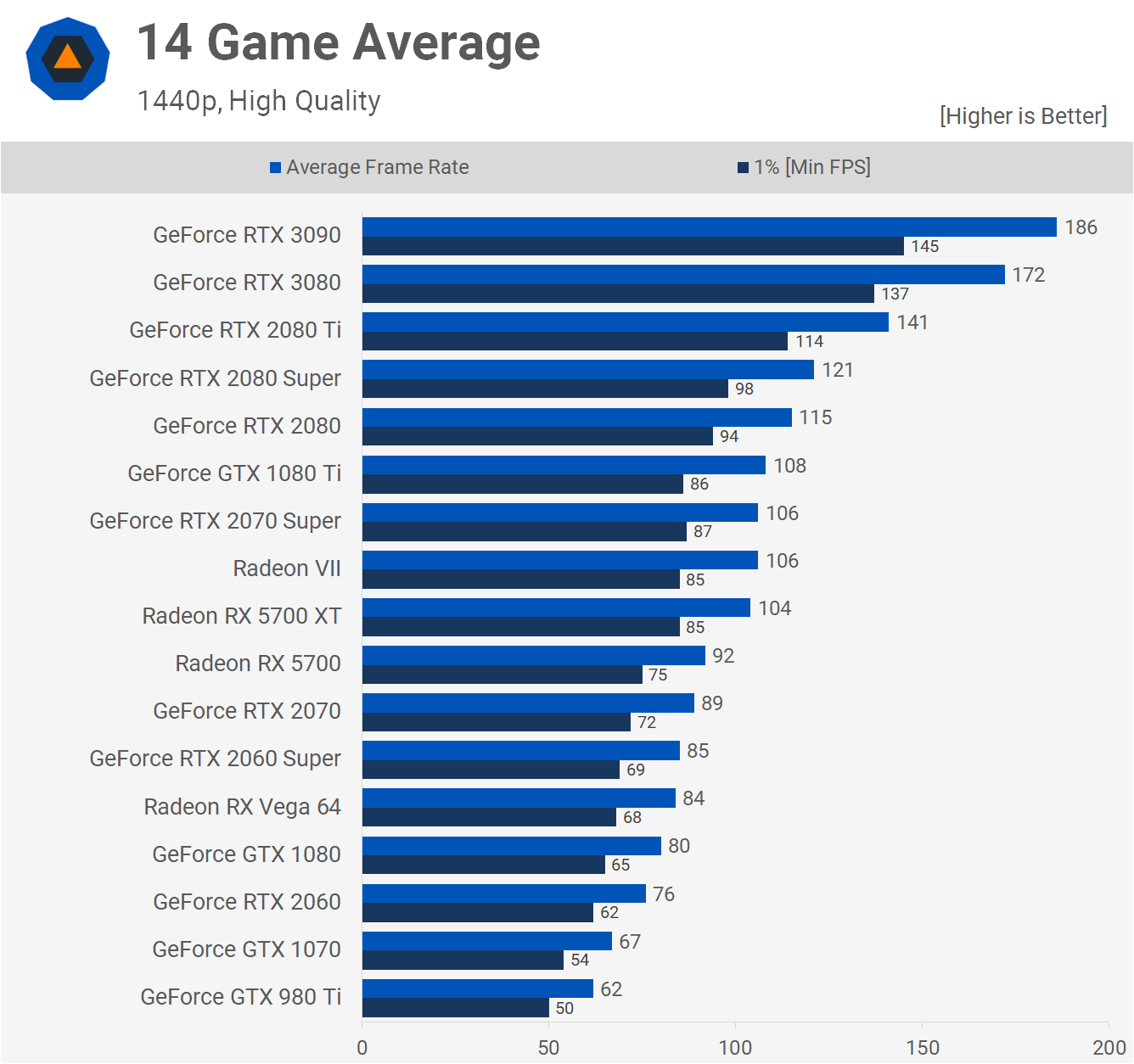
Starting with 1080p performance, we're looking at a modest 5% uplift over the RTX 3080 and a 21% increase over the RTX 2080 Ti, the only two relevant GPUs for this comparison. At 1440p the margin over the RTX 3080 grows to 8% and there's a 32% jump over the 2080 Ti. So spending 114% more on the RTX 3090 is going to be a pretty tough sell for an 8% increase at 1440p gaming, but then who are we kidding. Those with deep enough pockets won't hesitate to snap up that price to performance ratio.
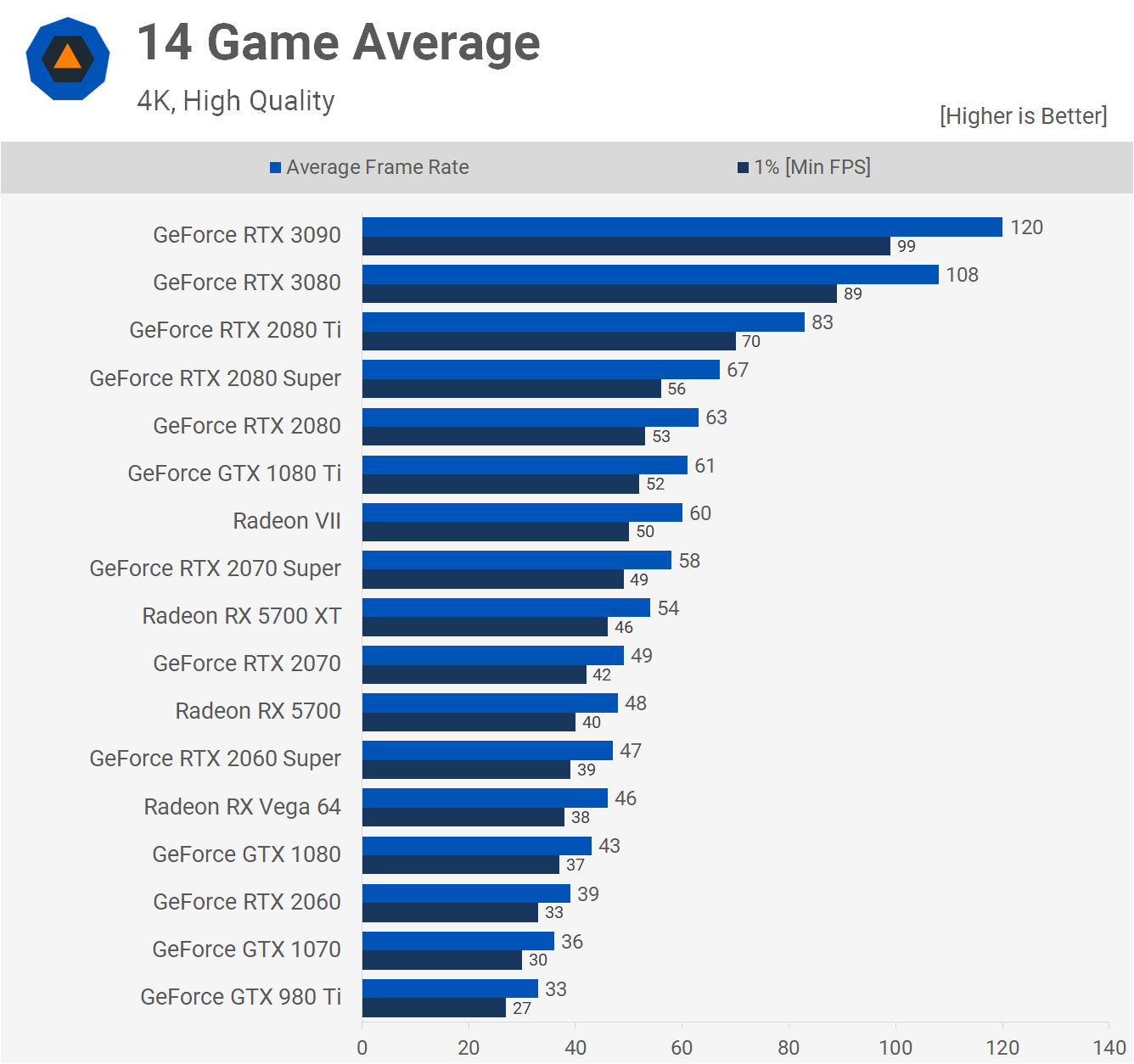
Finally, for those gaming at 4K, the RTX 3090 offers on average 11% more performance over the RTX 3080. If you're coming from an RTX 2080 Ti, that's a very respectable 45% increase in performance for a 25% increase in price.

The RTX 3090 FE doesn't consume much more power than the RTX 3080, at least when measuring the entire system consumption from the wall. We're still shy of 600 watts, so a decent 750 W unit will have you more than covered, at least without overclocking.
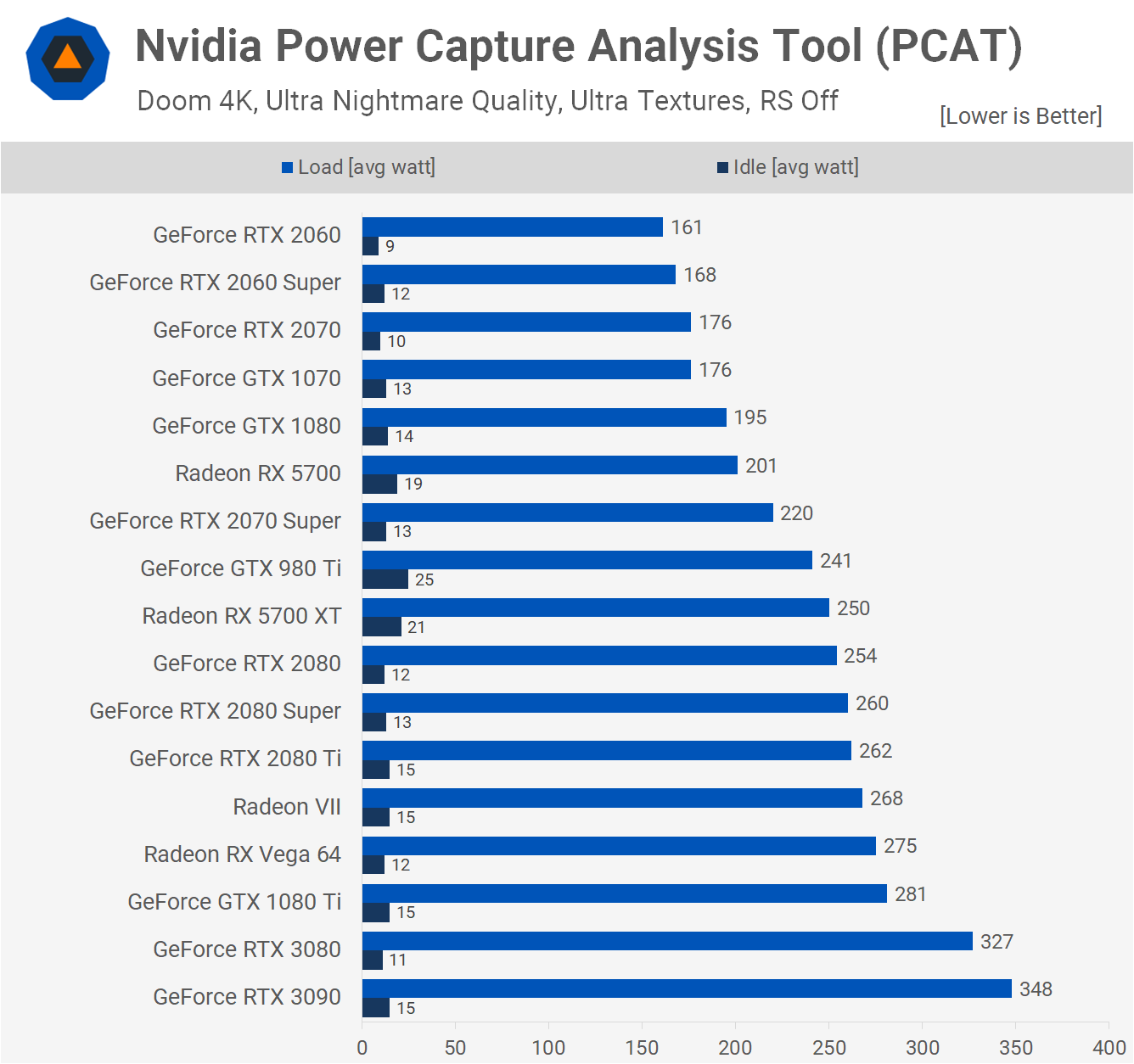
Using the Nvidia PCAT tool we see that the RTX 3090 consumes just 6% more power than the 3080 which is surprising, though it was only 11% faster in this test. Still, not a bad result and it explains why the RTX 3090 FE card runs so cool which we'll look at in a moment, but first here is a look at performance per watt.
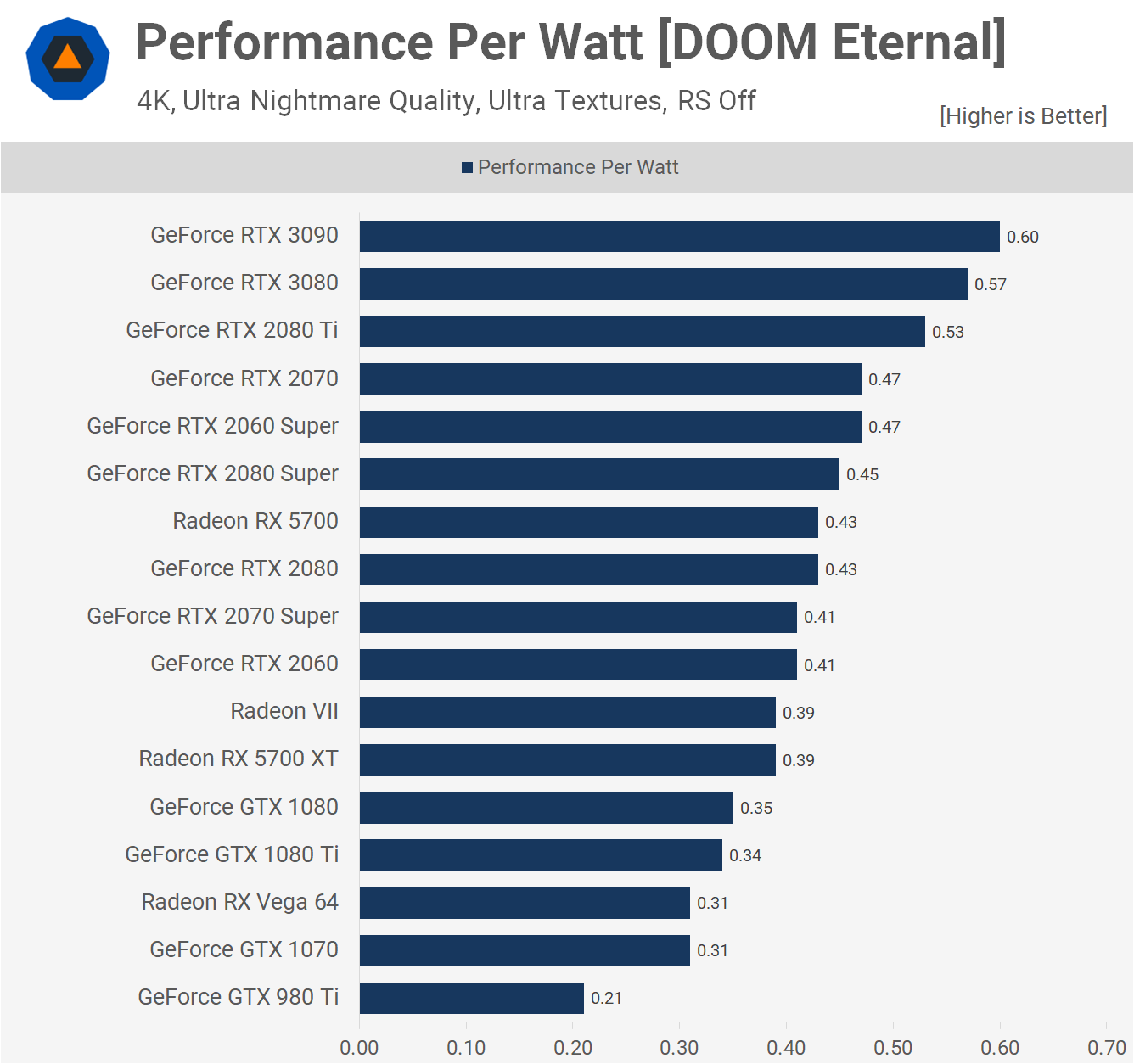
Based on these figures, the RTX 3090 is actually better than the 3080 in terms of performance per watt, no doubt this is due to a binning process that sees the best silicon reserved for the 3090. In terms of efficiency, the 3090 is surprisingly good.
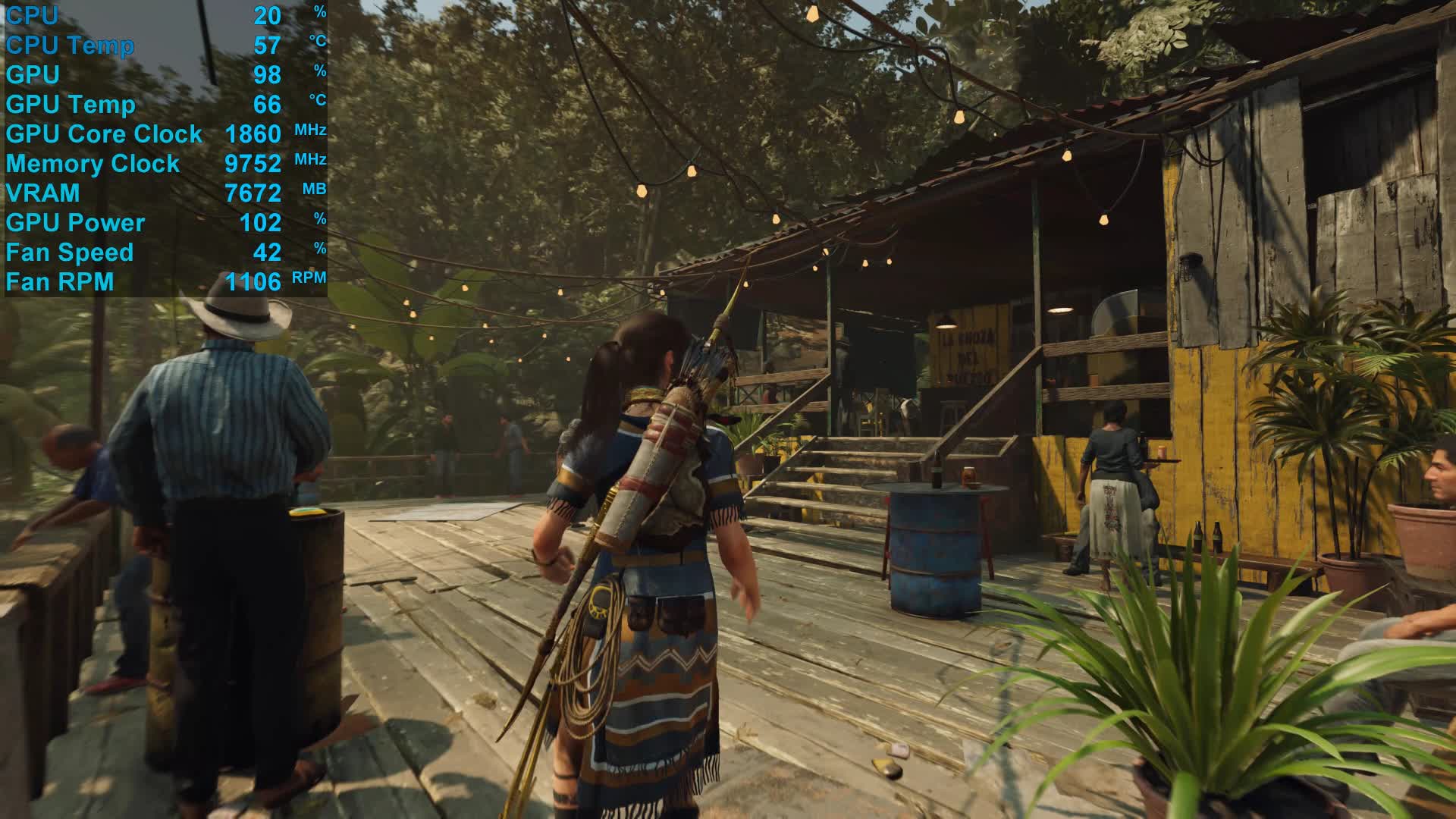
The "cool" thing about the massive RTX 3090 Founders Edition are the cool operating temperatures. Well, that and the fact that it is virtually silent. After an hour of gaming the fans spun at just over 1000 RPM where they were quieter than the other fans in our test system and therefore couldn't be heard. Despite that, the GPU peaked at just 66C and maintained an average clock speed of 1830 MHz. Very impressive stuff and a strong case for that massive heatsink.

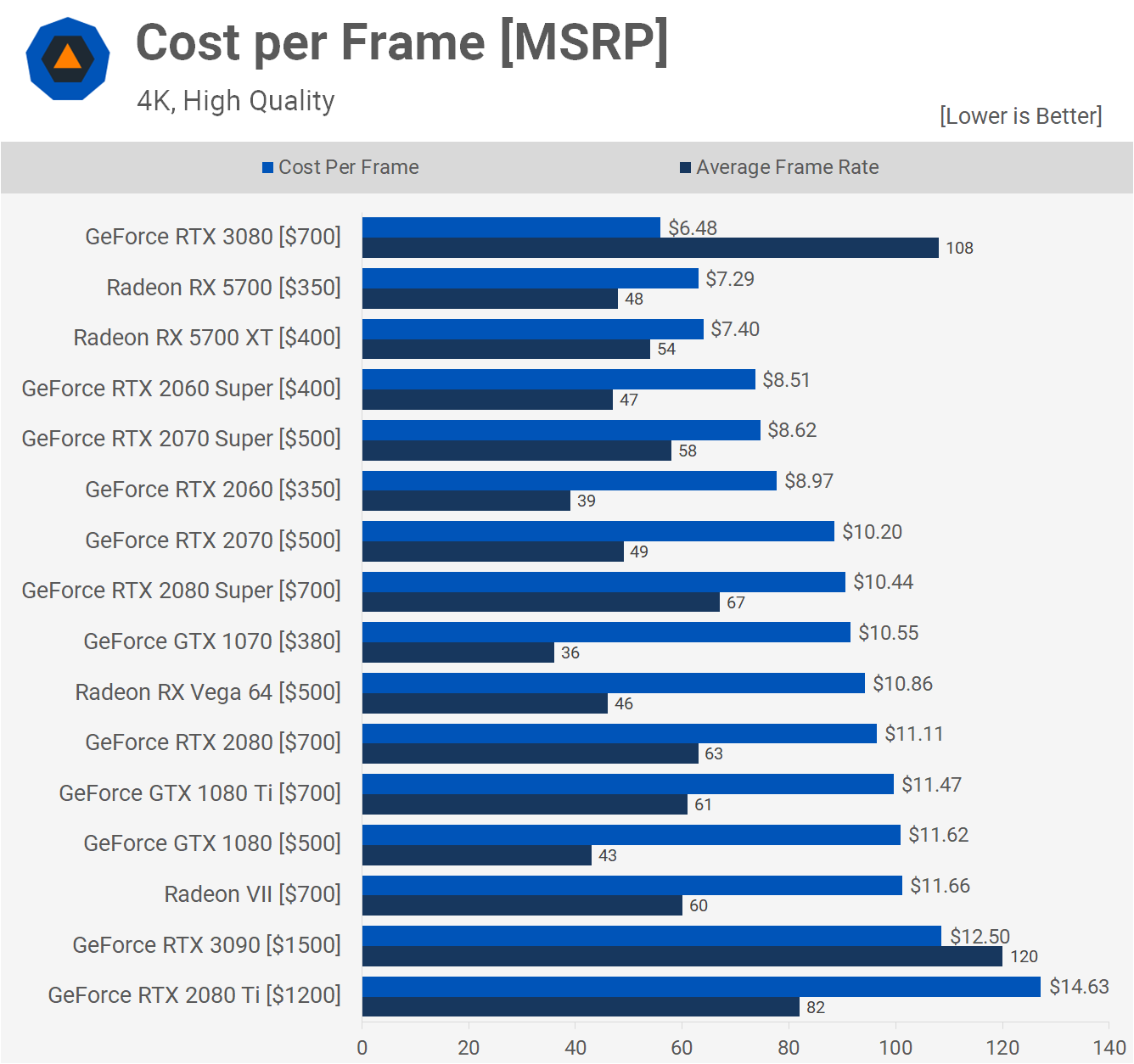
Here's a look at cost per frame, which isn't overly relevant for a product like the GeForce RTX 3090, but since we have the data, why not share it. No surprises here, the RTX 3090 is not a good value proposition for gamers, but it's also amusing to see that despite costing $1500, it's far better value than the RTX 2080 Ti.
Furthermore, at 4K the RTX 3090 is considerably better value than the RTX 2080 Ti and it's not much worse than parts released last year like the Radeon VII, for example. It's also crazy to see that in modern games it gets close to the GTX 1080, a GPU that was class-leading for its time.
Performance per Game
RTX 3090 vs RTX 3080
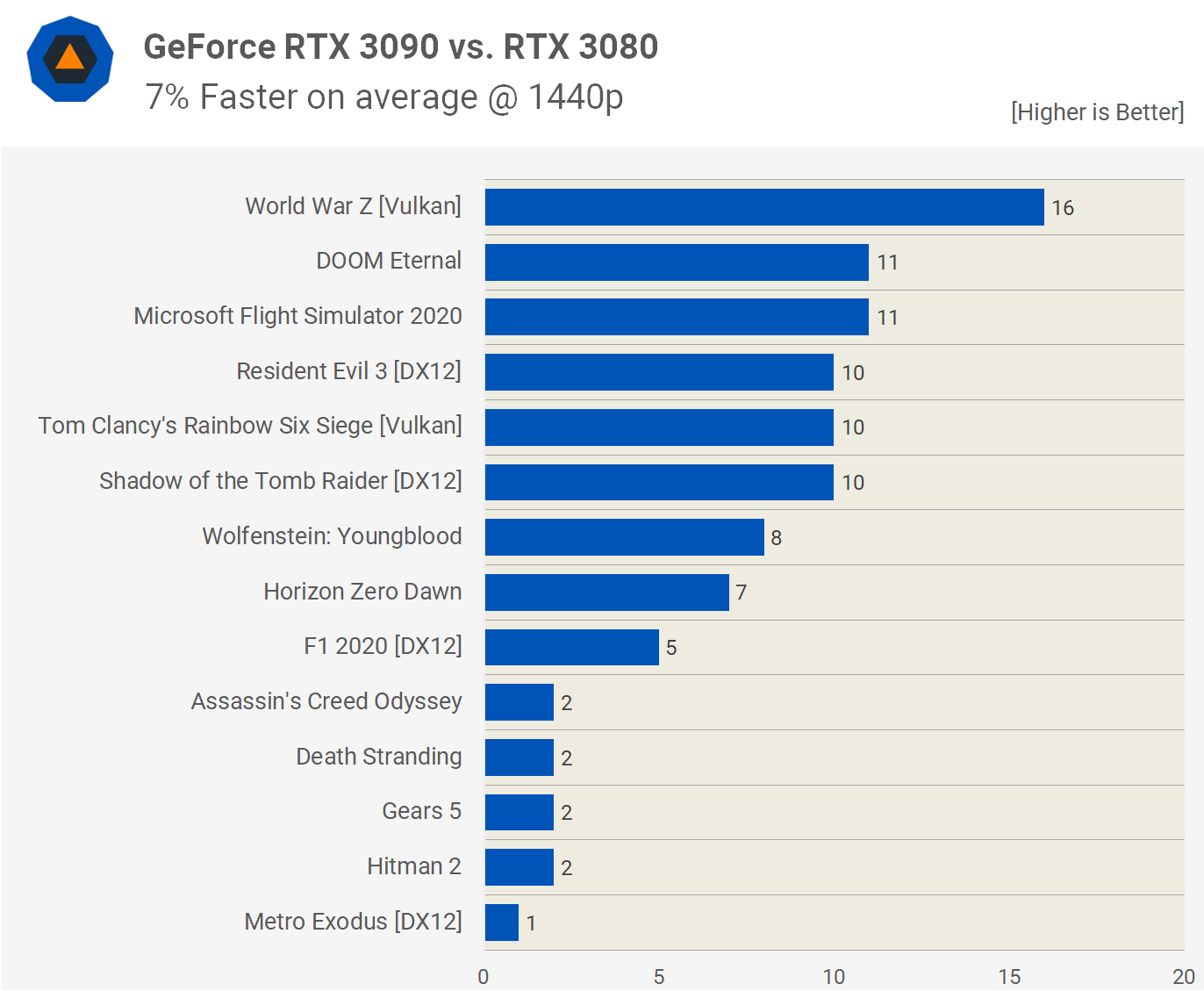
Here's a look at the percentage gains offered by the RTX 3090 over the 3080 in all the titles tested, starting with the 1440p data. As you can see at best it was 16% faster in World War Z, but typically we're looking at high single digit gains.
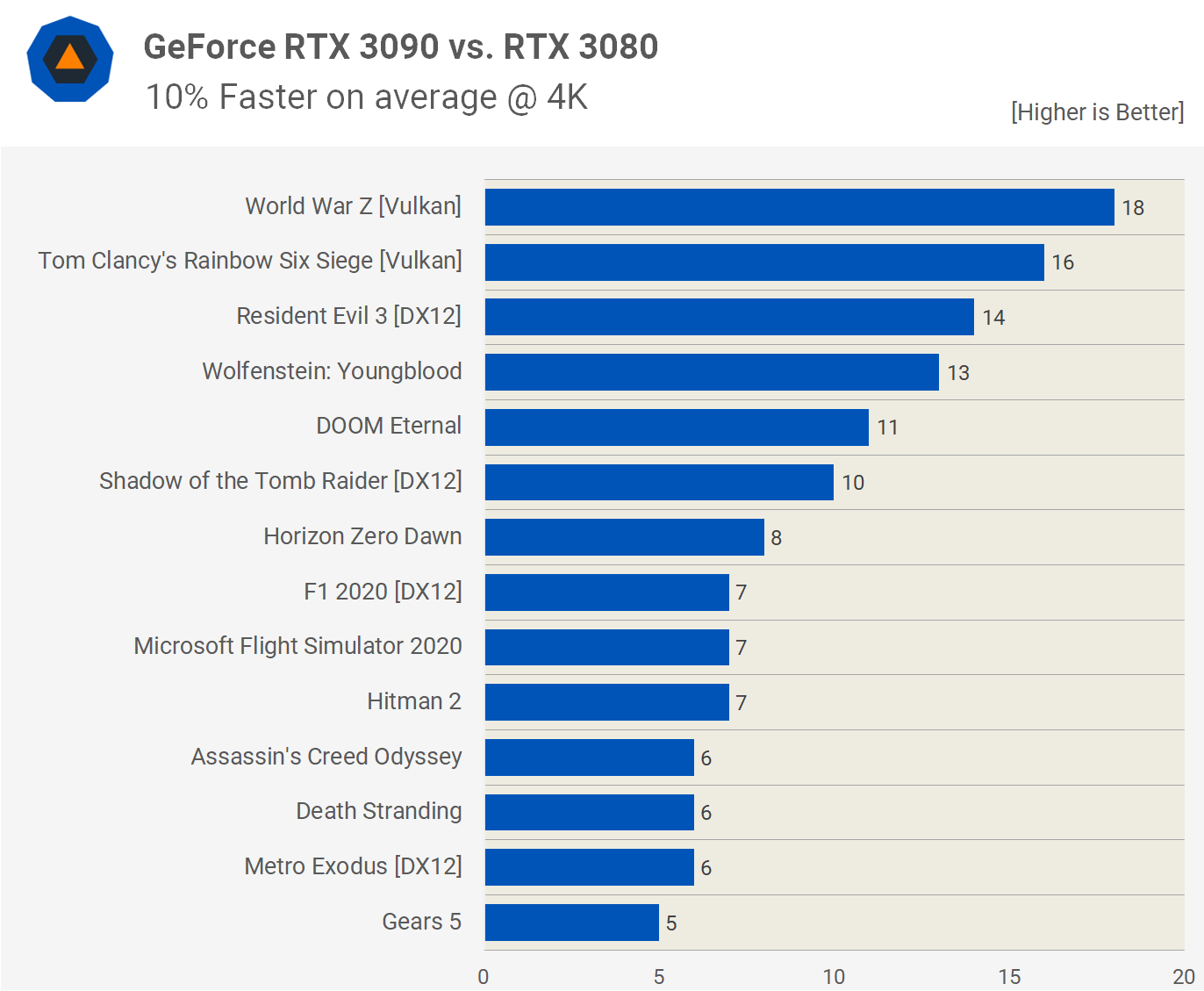
At 4K we're not CPU limited in any of the tests. A 5.3 GHz 10700K for example, provides the exact same frame rates in all titles tested with the RTX 3090. The 3090 was 10% faster on average with the biggest margin seen in World War Z again, where the 3090 was 18% faster.
RTX 3090 vs RTX 2080 Ti
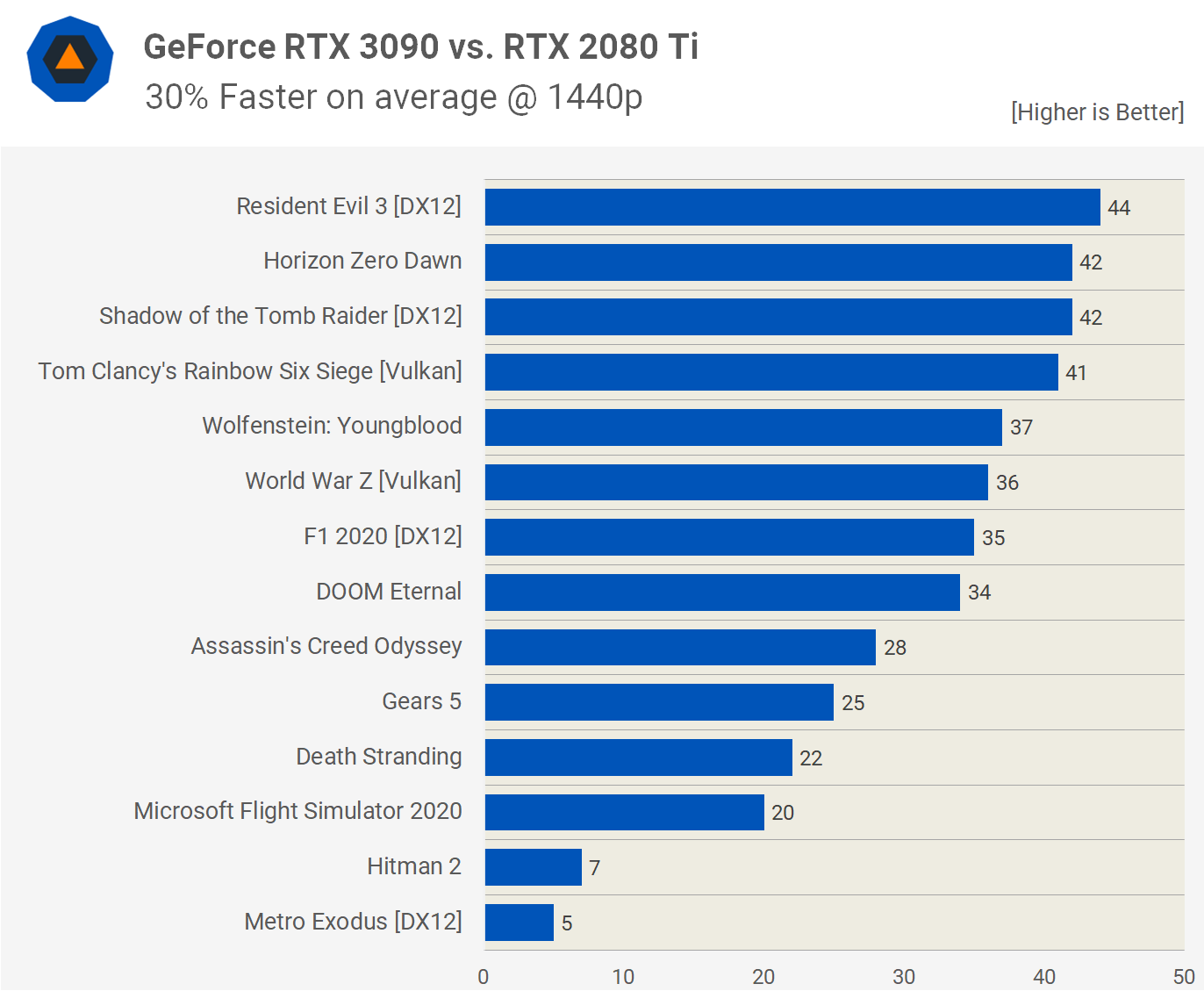
For those hoping to upgrade from a 2080 Ti, the peak gain we observed was a 44% performance improvement in Resident Evil 3. Typically though you are looking at about a 30% performance uplift, which is about what the 2080 Ti offered over the 1080 Ti for a 70% increase in price.
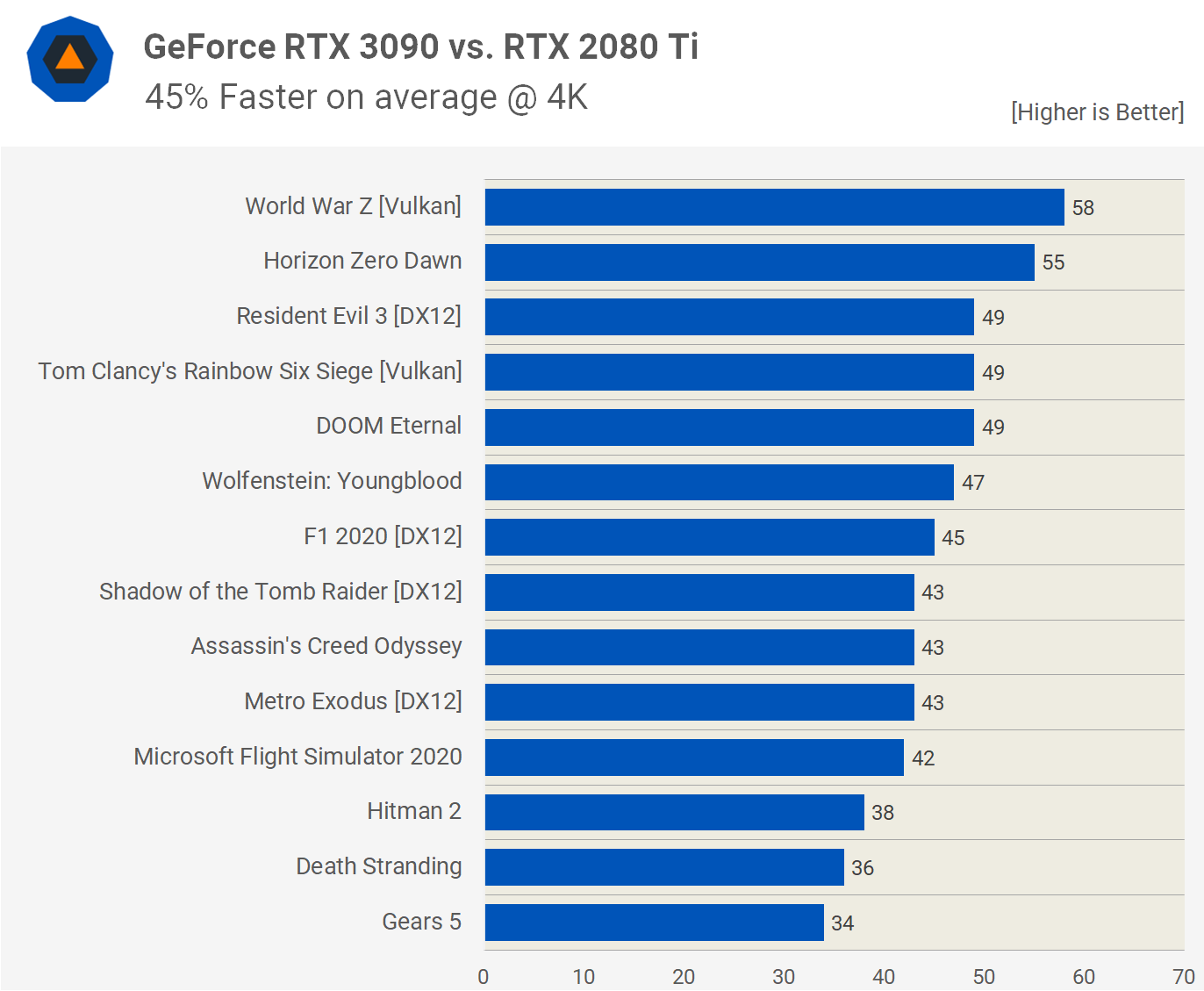
The margins are even better at 4K and now the RTX 3090 is up to 58% faster than the 2080 Ti.

We typically don't test GPU productivity performance in any of our reviews, but we went ahead and quickly tested a few GPUs in Blender. Here we can see that the Radeon VII was comparable to the RTX 2080 Ti in this application and that made it a great value option, though it wasn't that much faster than the vanilla 2080.
The RTX 3080 is a little over twice as fast as the Radeon VII in this test, boosting performance by 108%, or if you go the other way it reduced the render time by 52%.
We see that the RTX 3090 is 18% faster than the 3080 in Blender, which is in line with our best case gaming performance margin. Unless your workload requires more than 10 GB of VRAM, you're just much better off with the RTX 3080 in terms of value. As we said earlier, it's a simple equation for those running productivity tasks: if your workload requires a lot more than 10 GB of VRAM, the 3090 could be a godsend, if not, it's kind of pointless.
Bottom Line
The GeForce RTX 3090 is not nearly as exciting as last week's RTX 3080 release, but as soon as Jensen said this was a Titan class product, we knew what we were in for. If you're a PC gamer, the RTX 3090 doesn't really make much sense. The massive 24GB VRAM buffer has no appeal here, and despite Nvidia's best efforts, 8K gaming just isn't a thing, hell even 4K is still niche.
We did try out 8K gaming and it was impressive seeing 60 fps in Doom Eternal. It was also possible to average 60 fps in Control with the help of DLSS, rendering at 1440p, but then this is not true 8K gaming. Without DLSS, Control ran at 5 fps, so it's a bit stretch claiming 8K gaming given for the most part you will require DLSS support for it to happen. Doom Eternal did work well, it looks great, and we saw VRAM usage hit 16GB – actual usage, not just allocation.
Either way, we doubt gamers are keen for that 60 Hz 8K experience just yet. With most gamers targeting 1440p 144Hz, the RTX 3090 has little to offer over the 3080. This is also true when using a heavily overclocked Intel processor. Likewise, productivity tasks won't take full advantage of the RTX 3090 unless you can utilize that extra memory. If you do need 24 GB of VRAM, then the RTX 3090 is awesome. Previously you were looking at having to spend $2500 on a Titan RTX for the same memory capacity.
Lastly, the GeForce RTX 3090 Founders Edition model is truly outstanding and is probably going to be one of the best RTX 3090 graphics cards, if not the best.
